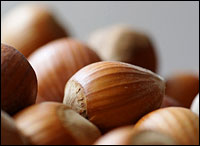This post marks the launch of our new food-advice column Checkout Line, by talented, funny, and food-obsessed Lou Bendrick. Ever get confused in the supermarket, wondering which “all-natural” label is legit? Ever wonder what you’d actually say to a farmer at a farmers market, or whether organic is better than local, or how you can stretch your dollar when you’re buying for the whole family? Lettuce know what food worries keep you up at night by writing us at groceries@grist.org.
Dear Checkout Line,
I love nuts, but I am always wondering what their origin is, since it rarely says on the can. What nuts are grown in the USA? What is nut season? Where can you find organic nuts?
Sincerely,
Karen Carlson
Dear Karen,
What a super question! Nuts are not only a tasty, healthy, on-the-go treat, but also an excellent source of puns and digressions, some of them quite ribald.
Just between us, I get “moody” (read: nine-headed monster) when my blood sugar dips, and I couldn’t get through the day without handfuls of nuts. In the spirit of research, I recently ate a gluttonous amount of cocoa-dusted, chocolate-covered almonds.
I must admit, though, I gave little thought to origins of my nuts until your inquiry came across my screen. Since then I’ve been munching and pondering, Where do all these nuts come from (a question usually reserved for the House of Representatives)?
So, with the help of Mr. Tucker Hill at the Northern Nut Growers Association, I ascertained that the following common nuts can be grown in the USA: almonds, chestnuts, hazelnuts (filberts), walnuts, macadamias, pine nuts, pistachios, and pecans (actual natives!). Peanuts and soynuts (technically legumes but considered nuts) can also be grown in here.
But because they can be grown here doesn’t mean they are grown here. The chocolate-covered almonds I gorged upon were, in fact, Spanish. Although the labels on the cans, jars, and bulk bins that contain nuts may not tell you the country of origin, they will give you enough information to do some sleuthing. (Sigh. Such is the role of the consumer today.)
One place to find truly homegrown nuts (aside from the Appropriations Committee) is a local farmers market, where you might find interesting cultivars or regional nuts (here in New England we get hickories, butternuts, and black walnuts). Although such growers might not be certified organic, they may eschew many of the dubious pesticides often used on nuts.
Seasonality, in a nutshell: Most nuts are harvested in the late summer or fall (just ask any squirrel!). This makes sense when consider that a nut is the dry, hard-shelled seed or fruit from certain trees or shrubs.
To find organic nuts, ask your local grocer to carry them specifically, if they don’t already. (My mantra about piping up: Remember that your fine question is a form of demand, and demand drives the market!) Because you mentioned cans, I’ll note that Planters, whose top-hatted, monocled mascot is recognized by most of us, now offers organic nuts; look for their organic cashews (too tropical to be grown in the USA, as are Brazil nuts, FYI) and organic mixed nuts.
Failing that, try the internet. LocalHarvest’s vast database might help you find nearby nuts, or you can use their catalog to order organic, domestic nuts. There are also many online retailers. One I like is Jaffee Bros., which carries both domestic and imported certified organic nuts. Speaking of online sources, if you are wont to indulge in digressive internet searches (as I am), you won’t be surprised to learn that a search on “nuts” in YouTube will yield many sophomoric videos pertaining to testicular pain.
Lastly, for free un-sprayed nuts, consider the atavistic thrill of foraging for wild edibles. Be sure to find a reputable foraging guide and remember, never, ever, eat anything you can’t identify. That’s just nuts.
I am,
Lou Bendrick



